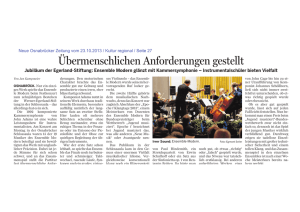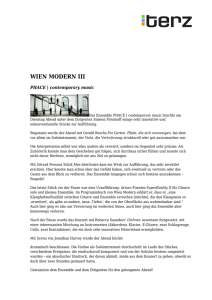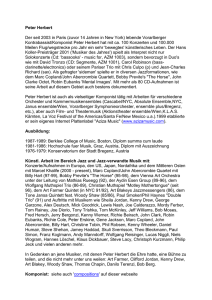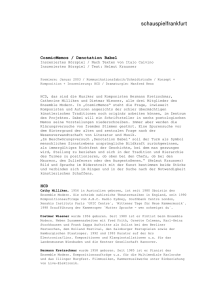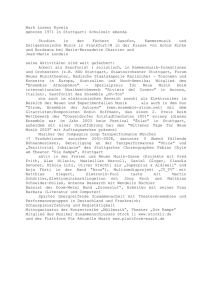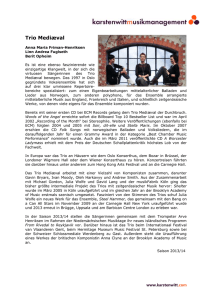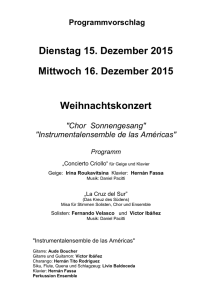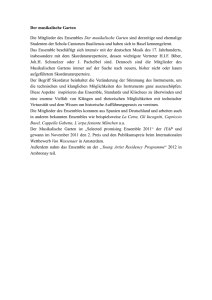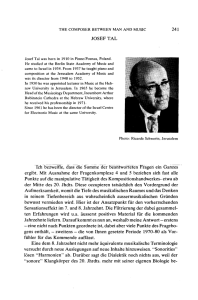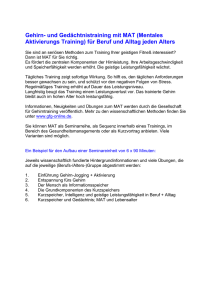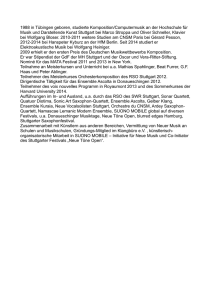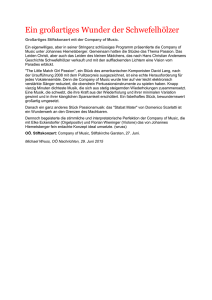Mark-Anthony Turnage About Time
Werbung
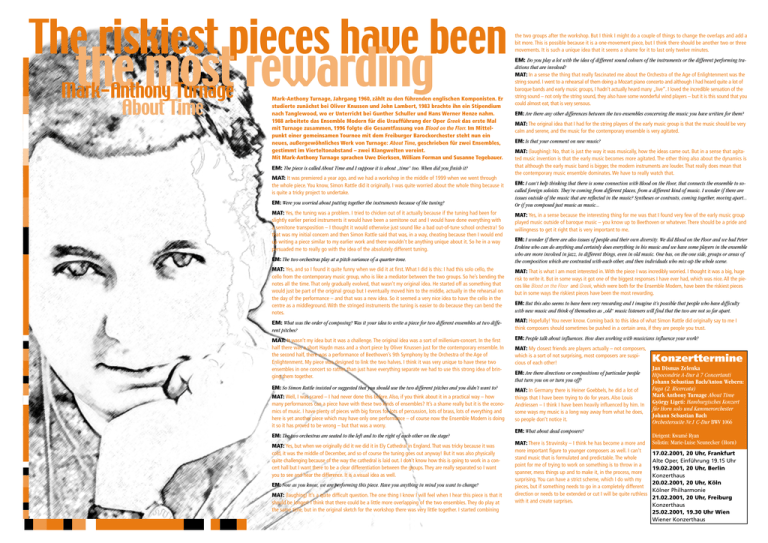
The riskiest pieces have been the most rewarding Mark-Anthony Turnage About Time Mark-Anthony Turnage, Jahrgang 1960, zählt zu den führenden englischen Komponisten. Er studierte zunächst bei Oliver Knussen und John Lambert, 1983 brachte ihn ein Stipendium nach Tanglewood, wo er Unterricht bei Gunther Schuller und Hans Werner Henze nahm. 1988 arbeitete das Ensemble Modern für die Uraufführung der Oper Greek das erste Mal mit Turnage zusammen, 1996 folgte die Gesamtfassung von Blood on the Florr. Im Mittelpunkt einer gemeinsamen Tournee mit dem Freiburger Barockorchester steht nun ein neues, außergewöhnliches Werk von Turnage: About Time, geschrieben für zwei Ensembles, gestimmt im Vierteltonabstand – zwei Klangwelten vereint. Mit Mark-Anthony Turnage sprachen Uwe Dierksen, William Forman und Susanne Tegebauer. EM: The piece is called About Time and I suppose it is about „time“ too. When did you finish it? MAT: It was premiered a year ago, and we had a workshop in the middle of 1999 when we went through the whole piece. You know, Simon Rattle did it originally. I was quite worried about the whole thing because it is quite a tricky project to undertake. EM: Were you worried about putting together the instruments because of the tuning? MAT: Yes, the tuning was a problem. I tried to chicken out of it actually because if the tuning had been for slightly earlier period instruments it would have been a semitone out and I would have done everything with a semitone transposition – I thought it would otherwise just sound like a bad out-of-tune school orchestra! So that was my initial concern and then Simon Rattle said that was, in a way, cheating because then I would end up writing a piece similar to my earlier work and there wouldn’t be anything unique about it. So he in a way persuaded me to really go with the idea of the absolutely different tuning. EM: The two orchestras play at a pitch variance of a quarter-tone. the two groups after the workshop. But I think I might do a couple of things to change the overlaps and add a bit more. This is possible because it is a one-movement piece, but I think there should be another two or three movements. It is such a unique idea that it seems a shame for it to last only twelve minutes. EM: Do you play a lot with the idea of different sound colours of the instruments or the different performing traditions that are involved? MAT: In a sense the thing that really fascinated me about the Orchestra of the Age of Enlightenment was the string sound. I went to a rehearsal of them doing a Mozart piano concerto and although I had heard quite a lot of baroque bands and early music groups, I hadn’t actually heard many „live“. I loved the incredible sensation of the string sound – not only the string sound, they also have some wonderful wind players – but it is this sound that you could almost eat, that is very sensous. EM: Are there any other differences between the two ensembles concerning the music you have written for them? MAT: The original idea that I had for the string players of the early music group is that the music should be very calm and serene, and the music for the contemporary ensemble is very agitated. EM: Is that your comment on new music? MAT: (laughing): No, that is just the way it was musically, how the ideas came out. But in a sense that agitated music invention is that the early music becomes more agitated. The other thing also about the dynamics is that although the early music band is bigger, the modern instruments are louder. That really does mean that the contemporary music ensemble dominates. We have to really watch that. EM: I can‘t help thinking that there is some connection with Blood on the Floor, that connects the ensemble to socalled foreign soloists. They’re coming from different places, from a different kind of music. I wonder if there are issues outside of the music that are reflected in the music? Syntheses or contrasts, coming together, moving apart... Or if you composed just music as music... MAT: Yes, in a sense because the interesting thing for me was that I found very few of the early music group played music outside of baroque music – you know up to Beethoven or whatever. There should be a pride and willingness to get it right that is very important to me. EM: I wonder if there are also issues of people and their own diversity. We did Blood on the Floor and we had Peter Erskine who can do anything and certainly does everything in his music and we have some players in the ensemble who are more involved in jazz, in different things, even in old music. One has, on the one side, groups or areas of the composition which are contrasted with each other, and then individuals who mix-up the whole scene. MAT: Yes, and so I found it quite funny when we did it at first. What I did is this: I had this solo cello, the cello from the contemporary music group, who is like a mediator between the two groups. So he’s bending the notes all the time. That only gradually evolved, that wasn’t my original idea. He started off as something that would just be part of the original group but I eventually moved him to the middle, actually in the rehearsal on the day of the performance – and that was a new idea. So it seemed a very nice idea to have the cello in the centre as a middleground. With the stringed instruments the tuning is easier to do because they can bend the notes. MAT: That is what I am most interested in. With the piece I was incredibly worried. I thought it was a big, huge risk to write it. But in some ways it got one of the biggest responses I have ever had, which was nice. All the pieces like Blood on the Floor and Greek, which were both for the Ensemble Modern, have been the riskiest pieces but in some ways the riskiest pieces have been the most rewarding. EM: What was the order of composing? Was it your idea to write a piece for two different ensembles at two different pitches? MAT: Hopefully! You never know. Coming back to this idea of what Simon Rattle did originally say to me I think composers should sometimes be pushed in a certain area, if they are people you trust. MAT: It wasn’t my idea but it was a challenge. The original idea was a sort of millenium-concert. In the first half there was a short Haydn mass and a short piece by Oliver Knussen just for the contemporary ensemble. In the second half, there was a performance of Beethoven’s 9th Symphony by the Orchestra of the Age of Enlightenment. My piece was designed to link the two halves. I think it was very unique to have these two ensembles in one concert so rather than just have everything separate we had to use this strong idea of bringing them together. EM: People talk about influences. How does working with musicians influence your work? EM: So Simon Rattle insisted or suggested that you should use the two different pitches and you didn’t want to? MAT: In Germany there is Heiner Goebbels, he did a lot of things that I have been trying to do for years. Also Louis Andriessen – I think I have been heavily influenced by him. In some ways my music is a long way away from what he does, so people don’t notice it. MAT: Well, I was scared – I had never done this before. Also, if you think about it in a practical way – how many performances can a piece have with these two kinds of ensembles? It’s a shame really but it is the economics of music. I have plenty of pieces with big forces for lots of percussion, lots of brass, lots of everything and here is yet another piece which may have only one performance – of course now the Ensemble Modern is doing it so it has proved to be wrong – but that was a worry. EM: The two orchestras are seated to the left and to the right of each other on the stage? MAT: Yes, but when we originally did it we did it in Ely Cathedral in England. That was tricky because it was cold, it was the middle of December, and so of course the tuning goes out anyway! But it was also physically quite challenging because of the way the cathedral is laid out. I don’t know how this is going to work in a concert hall but I want there to be a clear differentiation between the groups. They are really separated so I want you to see and hear the difference. It is a visual idea as well. EM: Now as you know, we are performing this piece. Have you anything in mind you want to change? MAT: (laughing) It’s a quite difficult question. The one thing I know I will feel when I hear this piece is that it should be longer! I think that there could be a little more overlapping of the two ensembles. They do play at the same time, but in the original sketch for the workshop there was very little together. I started combining EM: But this also seems to have been very rewarding and I imagine it’s possible that people who have difficulty with new music and think of themselves as „old“ music listeners will find that the two are not so far apart. MAT: My closest friends are players actually – not composers, which is a sort of not surprising, most composers are suspicious of each other! EM: Are there directions or compositions of particular people that turn you on or turn you off? EM: What about dead composers? MAT: There is Stravinsky – I think he has become a more and more important figure to younger composers as well. I can‘t stand music that is formulated and predictable. The whole point for me of trying to work on something is to throw in a spanner, mess things up and to make it, in the process, more surprising. You can have a strict scheme, which I do with my pieces, but if something needs to go in a completely different direction or needs to be extended or cut I will be quite ruthless with it and create surprises. Konzerttermine Jan Dismas Zelenka Hipocondrie A-Dur à 7 Concertanti Johann Sebastian Bach/Anton Webern: Fuga (2. Ricercata) Mark Anthony Turnage About Time György Ligeti: Hamburgisches Konzert für Horn solo und Kammerorchester Johann Sebastian Bach Orchestersuite Nr.1 C-Dur BWV 1066 Dirigent: Kwamé Ryan Solistin: Marie-Luise Neunecker (Horn) 17.02.2001, 20 Uhr, Frankfurt Alte Oper, Einführung 19.15 Uhr 19.02.2001, 20 Uhr, Berlin Konzerthaus 20.02.2001, 20 Uhr, Köln Kölner Philharmonie 21.02.2001, 20 Uhr, Freiburg Konzerthaus 25.02.2001, 19.30 Uhr Wien Wiener Konzerthaus 200 Jahre Musikverlag F.C. Peters Deutsche Post AG E N T G E LT B E Z A H LT 60316 FRANKFURT 102 Spendenaktion für das Ensemble Modern Am 1. Dezember 1800 gründeten der Wiener Komponist, Kapellmeister und Verleger Franz Anton Hoffmeister und der Leipziger Organist Ambrosius Kühnel ein „Bureau de Musique“ in Leipzig – eine Verbindung aus Verlag, Musikalien- und Instrumentenhandlung. Neben den verlegerischen Schwerpunkten, wie z.B. der Herausgabe der Klavier- und Orgelwerke Bachs, gelangte auch die Musikalienhandlung zu überregionaler Bedeutung: Goethe und Beethoven etwa bezogen von hier ihre Instrumente. 1814 ging das Unternehmen in den Besitz des Buchhändlers Carl Friedrich Peters über. Durch die Umtriebigkeit des späteren Leiters Henri Hinrichsen konnten Richard Strauss, Gustav Mahler, Hans Pfitzner und Arnold Schönberg in das Verlagsprogramm aufgenommen werden. Unter dem Naziregime wurde Henri Hinrichsen ermordet, nachdem der Musikverlag bereits zuvor enteignet worden war. In der DDR kam es zur erneuten Enteignung und so wurde Frankfurt am Main zum neuen Stammsitz gewählt. No.5 01/2001 Ensemble Modern Schwedlerstraße 2-4 D-60314 Frankfurt Fon +49 (0) 69-943 430 20 Fax +49 (0) 69-943 430 30 http://www.ensemble-modern.com e-mail:[email protected] zukommen zu lassen. Dafür sei dem Peters-Verlag hier herzlich gedankt. Viele namhafte zeitgenössische Komponisten sind beim Peters-Verlag unter Vertrag: Seit 20 Jahren verlegt Mauricio Kagel seine Werke hier exklusiv, außerdem sind u.a. John Cage, George Crumb, Brian Ferneyhough oder Erkki-Sven Tüür im Programm. Das Ensemble Modern brachte 1999 cinnabar der englischen Komponistin Rebecca Saunders zur Uraufführung, im Februar 2001 wird das Ensemble dieses Werk sowie duo 3 für Bratsche und Schlagzeug im Rahmen des Festival Présences in der Maison de Radio France als Französische Erstaufführung spielen. Im März 2002 kommt in der Kölner Philharmonie ein neues Werk von Rebecca Saunders für Ensemble Modern und die Stuttgarter Vocalsolisten zur Uraufführung. Das Ensemble Modern gratuliert ganz herzlich und freut sich auf die weitere fruchtbare Zusammenarbeit mit dem Musikverlag C.F. Peters! Anlässlich der Geburtstagsfeier am 1. Dezember 2000 im Sendesaal des Hessischen Rundfunks bat der Geschäftsführer des Peters-Verlags Karl Rarichs darum, von Präsenten abzusehen und statt dessen dem Ensemble Modern Spenden Alte und neue Kirchenmusik „die harte Nuß des Kontrapunkts [...] knacken“ Heinrich Schütz Im Zeitraum von 1944 sowie 1947 bis 1948 entstand Igor Stravinskys Messe. Gerade nach dem Zweiten Weltkrieg komponierte Stravinsky mehrfach religiöse Werke. Die Messe, ein persönliches Bekenntnis zur Religion, ist ganz auf den liturgischen Gebrauch einer römisch-katholischen Messe zugeschnitten, aus dem einfachen Grund, da in der russisch-orthodoxen Kirche der Gebrauch von Instrumenten im Gottesdienst verboten ist. Der lateinische Text, vorgetragen vom Collegium Vocale Gent, dient nicht als Träger eines Inhalts, sondern als rhyth11.04.2001, 20.45 Uhr, Ferrara Teatro Communale 12.04.2001, 20.45 Uhr, Reggio Emilia, Teatro Communale Heinrich Schütz Musikalische Exequien Igor Stravinsky Oktett Igor Stravinsky Messe Dirigent: Philippe Herreweghe Chor: Collegium Vocale Gent t e r m i n e 03.04.2001, 19.30 Uhr, London Barbican Centre 04.04.200, 20 Uhr, Gent Stadtkonzerte, Flandern Festival 07.04.2001, 17.30 Uhr, Rom Instituzione Universitaria di Concerti 09.04.2001, 20 Uhr, Innsbruck, Stiftskirche Wilten 10.04.2001, 20 Uhr, Bolzano Kathedrale „Der reine Kontrapunkt scheint mir die einzig mögliche Materie zu sein, mit der man starke und dauerhafte musikalische Formen schmiedet.“ Igor Stravinsky misches Material. Für die Messe gilt, was Stravinsky für sein Oktett formulierte, beide sind „musikalische Komposition[en], deren Komponenten in sich geschlossene objektive Elemente sind“. Ausdruck von Textinhalten oder deren bildliche Darstellung spielen in der Messe dagegen nur eine geringe Rolle (Walter Erbeck). Außerdem interpretiert das Collegium Vocale Gent die mehr als 300 Jahre zuvor entstandenen Musikalischen Exequien von Heinrich Schütz, eine Begräbnismesse für den Landesfürsten Heinrich Posthumus von Reuss, welcher die Texte zusammen mit dem Komponisten sowie seinem Hofprediger vorher ausgesucht hatte. Dies waren u.a. Bibelsprüchen und Kirchenlied-Strophen, die bereits noch zu Lebzeiten des Fürsten auf dessen Sarg angebracht worden waren. Konzerttermine Januar-April 2001 13.01.2001, 21 Uhr, Paris Le Kremlin Bicêtre/Paris, Sons d’Hiver Frith Traffic Continues I, Traffic Continues II - Gusto Solisten: Fred Frith (Gitarre) Ikue Mori (Elektrisches Schlagzeug) Zeena Parkins (Harfe) Dirigenten: Fred Frith; Franck Ollu Klangregie: Norbert Ommer 15.01.2001, 20 Uhr, Frankfurt Ort NN Verleihung des Ignaz-Bubis-Preises an Wolfgang Thierse Berio O King Solistin: Susanne Kelling, Mezzosopran Geschlossene Veranstaltung 19.01.2001, 20 Uhr, Hamburg Sendesaal des NDR, Das Neue Werk Lindberg Arena 2 Ligeti Aventures, Nouvelles Aventures Dirigent: Pierre-André Valade Solisten: Sarah Leonard (Sopran) Linda Hirst (Alt), Omar Ebrahim (Bariton) 23.01.2001, 20.30 Uhr, Frankfurt Oper Frankfurt, Happy New Ears Rihm Teile aus Séraphin Gast: Wolfgang Rihm Dirigent: Franck Ollu 25. und 26.01.2001, 20 Uhr, München 27.01.2001, 19 und 21.30 Uhr, München Kammerspiele Goebbels Eislermaterial Mit dem Schauspieler Josef Bierbichler 08.02.2001, 20 Uhr, Paris Maison de Radio France, Festival Présences Poppe Knochen (FEA) Eine Auftragskomposition der Stadt Frankfurt und des Ensemble Modern Frankfurt Zweitausend Schoeller Feuillages; Saunders cinnabar; Nunes Duktus Dirigent: Stefan Asbury Solisten: Jagdish Mistry (Violine), William Forman (Trompete) 09.02.2001, 20 Uhr, Paris Maison de Radio France, Festival Présences Hechtle screen (UA) Markeas Metaphora Dean Pastoral Symphony (UA) Lachenmann „... Zwei Gefühle...“, Musik mit Leonardo Dirigent: Stefan Asbury 10.02.2001, 17 Uhr, Paris Maison de Radio France Festival Présences Oehring Philipp Saunders duo 3 (FEA), Nunes Versus III Staud incipit (UA) Die Werke von Enno Poppe, Markus Hechtle und Brett Dean sind Auftragskompositionen der Stadt Frankfurt und des Ensemble Modern. Frankfurt Zweitausend Dirigent: Franck Ollu 17.02.2001, 20 Uhr, Frankfurt Alte Oper, Einführung um 19.15 Uhr 19.02.2001, 20 Uhr, Berlin Konzerthaus 20.02.2001, 20 Uhr, Köln Kölner Philharmonie 21.02.2001, 20 Uhr, Freiburg Konzerthaus Werke von Zelenka, J.S. Bach, Webern, Turnage, Ligeti 25.02.2001, 19.30 Uhr, Wien Wiener Konzerthaus Werke von Zelenka, J.S. Bach, Webern, Turnage, Ligeti 23./ 24.02.2001, Basel Kaserne 01. – 04.03.2001, 20 Uhr, Frankfurt TAT im Bockenheimer Depot Goebbels Eislermaterial Mit dem Schauspieler Josef Bierbichler 14.03.2001, 19 Uhr, Berlin Kammermusiksaal der Philharmonie, 18. Musik-Biennale Guezec Ensemble Multicolore 65 Osborn This Fragile Vial (UA) Boulez cummings ist der dichter Barraqué Concerto Dirigent: David Coleman Solisten: Julie Randall Osborn (Sopran), Roland Diry (Klarinette), Rumi Ogawa-Helferich (Vibraphon) Chor: RIAS Kammerchor 16.03.2001, 20 Uhr, Frankfurt Alte Oper, Einführungsvortrag um 19.15 Uhr 17.03.2001, 16 Uhr, Berlin, Kammermusiksaal der Philharmonie, 18. Musik-Biennale Grisey Quatre Chants pour franchir le Seuil Boulez Incises, sur incises Dirigent: George Benjamin Solisten: Valdine Anderson (Sopran), Ueli Wiget (Klavier) 19.03.2001, 19.30 Uhr, Wien Wiener Konzerthaus Boulez Incises, sur incises Dirigent: David Coleman Solistin: Valdine Anderson (Sopran) 24.03.2001, 20.30 Uhr, Brüssel Théâtre Marni Rihm Jagden und Formen (BEA des Zustands X/2000) Dirigentin: Dominique My 25.03.2001, 20.30 Uhr, Brüssel Conservatoire de Bruxelles Czernowin Afatsim Carter Clarinet Concerto Dean Pastoral Symphony (BEA) Auftragswerk der Stadt Frankfurt und des Ensemble Modern Frankfurt Zweitausend Birtwistle Ritual Fragment Ligeti Hamburgisches Konzert für Horn und Orchester Solisten: Marie Luise Neunecker (Horn), Roland Diry (Klarinette) 27.03.2001, 20.30 Uhr, Frankfurt Schauspielhaus Happy New Ears Carter Clarinet Concerto Solist: Roland Diry (Klarinette) 03.04.2001, 19.30 Uhr, London Barbican Centre 04.04.2001, 20 Uhr, Gent Stadtkonzerte, Flandern Festival 07.04.2001, 17.30 Uhr, Rom Instituzione Universitaria di Concerti 09.04.2001, 20 Uhr, Innsbruck Stiftskirche Wilten 10.04.2001, 20 Uhr, Bolzano Kathedrale 11.04.2001, 20.45 Uhr, Ferrara Teatro Communale 12.04.2001, 20.45 Uhr, Reggio Emilia Teatro Communale Werke von Schütz und Stravinsky Änderungen vorbehalten Impressum: Redaktion: Susanne Tegebauer, Ensemble Modern Beiträge: Die Texte sind Originalbeiträge für diese Ausgabe. © Ensemble Modern. Abdruck nur mit Genehmigung. Fotos: © Boosey & Hawkes, Dominik Buschardt, Katie Vandyck, Universitätsbibliothek Leibzig Layout: www.headware.de Druck: Druckerei Imbescheidt KG Das Ensemble Modern wird über die Deutsche Ensemble Akademie gefördert durch die Stadt Frankfurt, das Land Hessen, die Kulturstiftung der Länder aus Mitteln des Beauftragten der Bundesregierung für Angelegenheiten der Kultur und der Medien, die GVL und die GEMA-Stiftung. Januar 2001
